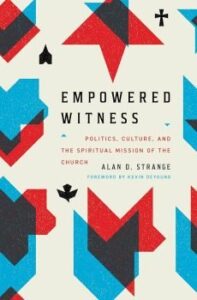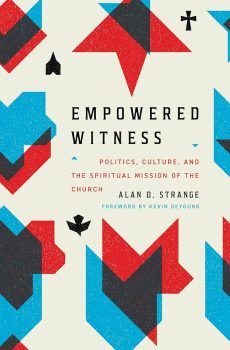 Alan D. Strange, Empowered Witness: Politics, Culture, and the Spiritual Mission of the Church. Wheaton: Crossway, 2024. $16.99, paperback.
Alan D. Strange, Empowered Witness: Politics, Culture, and the Spiritual Mission of the Church. Wheaton: Crossway, 2024. $16.99, paperback.
2024 is a polarizing election year in America. Widely divergent political visions strive for cultural dominance. To be sure, claims about the breadth of the division are frequently overwrought and untrue. Today’s situation is not comparable to the fissures that cracked the foundation of society in antebellum America, fault lines that would eventually shatter national unity and lead to civil war. Still, contemporary forces on the political right and left compete vigorously for adherents among the electorate. The church is not exempt from cultural turmoil. Many congregations are deeply divided both over political issues and the question of how (if at all) their churches should respond to them.
Pastors attempting to navigate their churches through these troubled waters need mature and historically informed leaders who have thought deeply about the relationship between church and politics. Alan Strange is one such voice. His Empowered Witness helpfully reacquaints contemporary believers with the doctrine of the spirituality of the church.
A fresh look at the doctrine is certainly needed. Often it is rejected out of hand as a theological tool to bar the church from taking positions on weighty and controversial moral issues — a doctrinal cover for Christians advocating slavery in the 19th century, as well as massive Southern resistance to civil rights legislation in the 20th. The doctrine’s detractors claim it presents a privatized faith that leaves the nation bereft of the church’s prophetic witness and call to repentance.
The author is not without sympathy for these concerns. Nevertheless, he offers a spirited defense of the doctrine. Building upon his previous work in this area (The Doctrine of the Spirituality of the Church in the Ecclesiology Charles Hodge, 2017), Strange explores Hodge’s articulation of the doctrine of the spirituality of the church within the context of the greatest political and moral question of the 19th century, namely, race-based chattel slavery. After defining the doctrine (chapter 1), he discusses the doctrine’s adherents, their varying and, at times, conflicting understandings of it, and debates over it in the courts of the Presbyterian church before, during, and after the Civil War (chapters 2-5). Finally, he argues for the continuing relevance of the doctrine in the life of the church (chapter 6).
